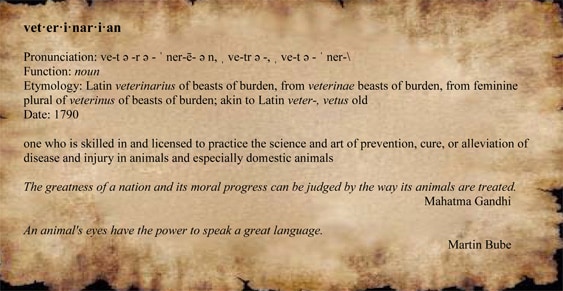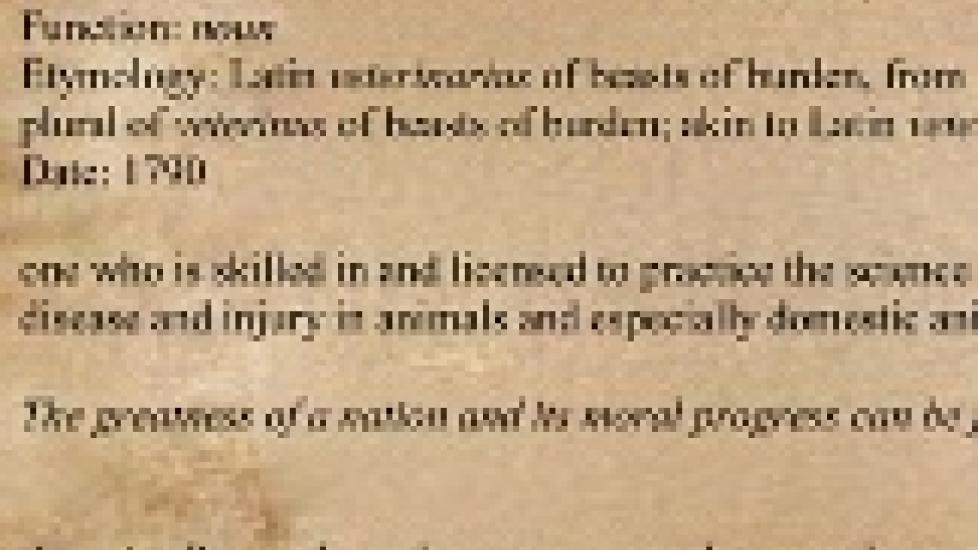How to Properly Pronounce Veterinarian
Recently, I was lecturing at a large, national veterinary conference. After giving several hours of continuing medical education lectures, I overheard a veterinarian complain that she didn’t like the way that I pronounced "veterinarian."
That’s right, folks. The pronunciation!
Complain about the scientific content of my lecture, but not my pronunciation, OK? (I didn’t have the heart to step in and tell said whiner that I had won the 2011 Small Animal Speaker of the Year award for North American Veterinary Conference, but hey…).
It’s an embarrassment that veterinary professionals out there seem to get three major things wrong about the veterinary profession. Of course, I will now expose myself for a complete grammar snob in the process, but I think it’s important for all to know these three pet-peeves of mine:
1. Mispronouncing veterinarian
Even veterinarians pronounce this wrong. Dude, it’s your profession, so let’s all learn how to say it properly. This all stems from my first day of veterinary school at Cornell University’s College of Veterinary Medicine (recently ranked #1 in the country, again!).
The very first thing the Dean told us at orientation was this sage advice: "If you learn one thing from veterinary school, learn how to pronounce veterinarian. It’s not 'vet-re-narian.' It’s 'vet-er-in-ar-ian.'" In the same way, it’s not "vet-ran," rather, it is "vet-er-an."
Could be an Ivy League Ivory Tower (i.e., snotty) thing to say at our first day of orientation, but it’s since become a big sticking point — just as my mad, old professor predicted.
2. Misspellings in medical records
People often forget that a medical record is a legal document. Ideally, it should be legibly written, and all attempts at proper spelling should be maintained. A few hard words to spell in veterinary medicine? Vomiting (not vomitting). Ophthalmology (not ophthamology). Pus-filled. (Not pus-sy). Seriously! Let’s be professional here, right?
3. Mispronouncing Lyme disease
Alert: It is not LYME’S disease. It’s Lyme disease. I’m too embarrassed to correct veterinarians who say this wrong, as I feel they should know better. Lyme disease was named after Old Lyme, Connecticut, where it was discovered. The people of Old Lyme would appreciate it if you didn’t call it Lyme’s disease, too. They’re quite proud of their viropathological heritage (city motto: "Catch old Lyme! It’s contagious!").
Lyme disease is a very serious illness that manifests in symptoms such as shifting leg lameness and joint swelling to life-threatening Lyme nephropathy. You can’t pronounce this for a reason — it’s too scary to comprehend. This nephropathy, also called protein-losing nephropathy (PLN), is a life-threatening, debilitating illness where the kidneys lose too much protein and end up failing (causing chronic weight loss, excessive urination, constant thirst, diluted urine, anemia, vomiting, and high blood pressure).
***
Now here’s a simple word of advice for finding a good veterinarian: Find one that can pronounce the profession right, spell "vomiting" correctly, and calls the poor tick-borne disease by its proper name. Otherwise, how can you trust them to treat it?
Snottingly yours,

Dr. Justine Lee
Pic of the day: veterinarian by Princeton University

